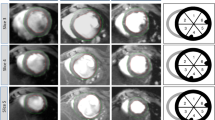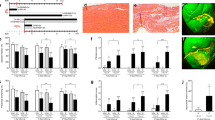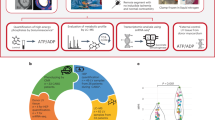Abstract
Cardiogenic shock is the leading cause of death among patients hospitalized with acute myocardial infarction (MI). Understanding the mechanisms for acute pump failure is therefore important. The aim of this study is to examine in an acute MI dog model whether mitochondrial bio-energetic function within non-ischemic wall regions are associated with pump failure. Anterior MI was produced in dogs via ligation of left anterior descending (LAD) coronary artery, that resulted in an infract size of about 30% of the left ventricular wall. Measurements of hemodynamic status, mitochondrial function, free radical production and mitochondrial uncoupling protein 3 (UCP3) expression were determined over 24 h period. Hemodynamic measurements revealed a > 50% reduction in cardiac output at 24 h post infarction when compared to baseline. Biopsy samples were obtained from the posterior non-ischemic wall during acute infarction. ADP/O ratios for isolated mitochondria from non-ischemic myocardium at 6 h and 24 h were decreased when compared to the ADP/O ratios within the same samples with and without palmitic acid (PA). GTP inhibition of (PA)-stimulated state 4 respiration in isolated mitochondria from the non-ischemic wall increased by 7% and 33% at 6 h and 24 h post-infarction respectively when compared to sham and pre-infarction samples. This would suggest that the mitochondria are uncoupled and this is supported by an associated increase in UCP3 expression observed on western blots from these same biopsy samples. Blood samples from the coronary sinus measured by electron paramagnetic resonance (EPR) methods showed an increase in reactive oxygen species (ROS) over baseline at 6 h and 24 h post-infarction. In conclusion, mitochondrial bio-energetic ADP/O ratios as a result of acute infarction are abnormal within the non-ischemic wall. Mitochondria appear to be energetically uncoupled and this is associated with declining pump function. Free radical production may be associated with the induction of uncoupling proteins in the mitochondria.
Similar content being viewed by others

Log in or create a free account to read this content
Gain free access to this article, as well as selected content from this journal and more on nature.com
or
References
Duvernoy CS, Bates ER . Management of cardiogenic shock attributable to acute myocardial infarction in the reperfusion era. J Intensive Care Med 2005; 20: 188–198.
Babaev A, Frederick PD, Pasta DJ, et al. NRMI Investigators. Trends in management and outcomes of patients with acute myocardial infarction complicated by cardiogenic shock. JAMA 2005; 294:448–454.
Yersdorf F, Okamoto F, Buckberg GD, et al. Studies on prolonged acute regional ischemia. II. Implications of progression from dyskinesia to akinesia in the ischemic segment. J Thorac Cardiovasc Surg 1989; 98:224–233.
Rechavia E, de Silva R, Nihoyannopoulos P, et al. Hyperdynamic performance of remote myocardium in acute infarction. Correlation between regional contractile function and myocardial perfusion. Eur Heart J 1995; 16:1845–1850.
Beyersdorf F, Buckberg GD, Acar C, et al. Cardiogenic shock after acute coronary occlusion. Pathogenesis, early diagnosis, and treatment. Thorac Cardiovasc Surg 1989; 37:28–36.
Tatsumi T, Matoba S, Kawahara A, et al. Cytokine-induced nitric oxide production inhibits mitochondrial energy production and impairs contractile function in rat cardiac myocytes. J Am Coll Cardiol 2000; 35:1338–1346.
Kaasik A, Joubert F, Ventura-Clapier R, Veksler V . A novel mechanism of regulation of cardiac contractility by mitochondrial functional state. FASEB J 2004; 18:1219–1227.
Shin G, Sugiyama M, Shoji T, et al. Detection of mitochondrial membrane damages in myocardial ischemia with ESR spin labeling technique. J Mol Cell Cardiol 1989; 21:1029–1036.
Weishaar R, Sarma JS, Maruyama Y, Fischer R, Bing RJ . Regional blood flow, contractility and metabolism in early myocardial infarction. Cardiology 1977; 62:2–20.
Rouslin W . Myocardial acidosis and the mitigation of tissue ATP depletion in ischemic cardiac muscle: the role of the mitochondrial ATPase. Adv Exp Med Biol 1986; 194:355–373.
Bittl JA, Weisfeldt ML, Jacobus WE . Creatine kinase of heart mitochondria. The progressive loss of enzyme activity during in vivo ischemia and its correlation to depressed myocardial function. J Biol Chem 1985; 260:208–214.
Shell WE, Kjekshus JK, Sobel BE . Quantitative assessment of the extent of myocardial infarction in the conscious dog by means of analysis of serial changes in serum creatine phosphokinase activity. J Clin Invest 1971; 50:2614–2625.
Lantos J, Temes G, Gobolos L, Jaberansari MT, Roth E . Is peripheral blood a reliable indicator of acute oxidative stress following heart ischemia and reperfusion? Med Sci Monit 2001; 7:1166–1170.
Ishioka K, Kanehira K, Sasaki N, et al. Canine mitochondrial uncoupling proteins: structure and mRNA expression of three isoforms in adult beagles. Comp Biochem Physiol B Biochem Mol Biol 2002; 131:483–489.
Singal PK, Khaper N, Palace V, Kumar D . The role of oxidative stress in the genesis of heart disease. Cardiovasc Res 1998; 40:426–432.
Hogg N . Free radicals in disease. Semin Reprod Endocrinol 1998; 16:241–248.
Heuch G . Hibernating myocardium. Physiol Rev 1998; 78:1055–1085.
Budinger GR, Duranteau J, Chandel NS, Schumacker PT . Hibernation during hypoxia in cardiomyocytes: role of mitochondria as the O2 sensor. J Biol Chem 1998; 273:3320–3326.
Buttke TM, Sandstrom PA . Oxidative stress as a mediator of apoptosis. Immunol Today 1994; 15:7–10.
Von Harsdorf R, Li PF, Dietz R . Signaling pathways in reactive oxygen species induced cardiomyocyte apoptosis. Circulation 1999; 99:2934–2941.
Echtay KS, Roussel D, St-Pierre J, et al. Superoxide activates mitochondrial uncoupling proteins. Nature 2002; 415:96–99.
Andreyev AY, Kushnareva YE, Starkov AA . Mitochondrial metabolism of reactive oxygen species. Biochemistry 2005; 70:200–214.
Li LX, Skorpen F, Egeberg K, Jorgensen IH, Grill V . Uncoupling protein-2 participates in cellular defense against oxidative stress in clonal beta-cells. Biochem Biophys Res Commun 2001; 282:273–277.
Hoerter J, Gonzalez-Barroso MD, Couplan E, et al. Mitochondrial uncoupling protein 1 expressed in the heart of transgenic mice protects against ischemic-reperfusion damage. Circulation 2004; 110:528–533.
Vincent AM, Olzmann JA, Brownlee M, Sivitz WI, Russell JW . Uncoupling proteins prevent glucose-induced neuronal oxidative stress and programmed cell death. Diabetes 2004; 53:726–734.
Lefemine AA, Dunbar J, DeLucia A, Low HBC . Single-pump techniques for assisted circulation in cardiogenic shock experimental evaluation and case report. Texas Heart Inst J 1988; 15:17–24.
Acknowledgements
We thank Miss Tan Li Ling Olivia for western blot and Miss Liew Yu Ying for technical support. We also thank Dr Zue Yi-Zhun (National University of Singapore) for providing the equipment for hemodynamic measurements. Special thanks also go to Dr L Retnam and Mr Low Wai Mun James (AHU, National University of Singapore) for the important technical assistance and animal handling. This work was supported in part by Academic Research Fund (ARF), Singapore (R-185-000-060-112), National Medical Research Council (NMRC), Singapore (R-185-000-058-213), and Biomedical Research Council (BMRC), Singapore (R-185-000-065-305) to Yuru Deng.
Author information
Authors and Affiliations
Corresponding author
Rights and permissions
About this article
Cite this article
Almsherqi, Z., McLachlan, C., Slocinska, M. et al. Reduced cardiac output is associated with decreased mitochondrial efficiency in the non-ischemic ventricular wall of the acute myocardial-infarcted dog. Cell Res 16, 297–305 (2006). https://doi.org/10.1038/sj.cr.7310037
Received:
Revised:
Accepted:
Published:
Issue date:
DOI: https://doi.org/10.1038/sj.cr.7310037
Keywords
This article is cited by
-
Shortened leukocyte telomere length in type 2 diabetes mellitus: genetic polymorphisms in mitochondrial uncoupling proteins and telomeric pathways
Clinical and Translational Medicine (2016)
-
Mitochondrial oxidative metabolism and uncoupling proteins in the failing heart
Heart Failure Reviews (2015)


